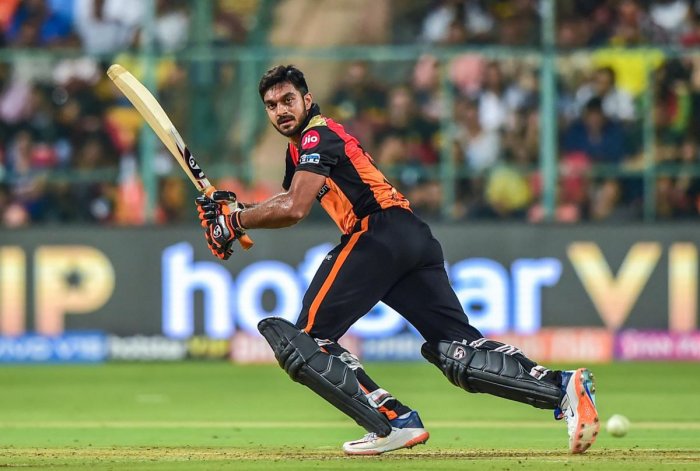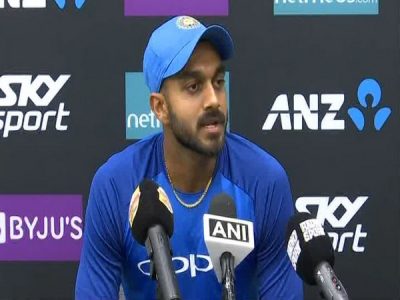
At the warm-up game, India will look to finalise number four slot

Death, taxes and this Indian management’s fidgety outlook towards finding a suitable number four in ODIs are three certainties of life for any cricket fan that waits for the commencement of the World Cup 2019. For the uninformed, two years ago after a crestfallen defeat against arch-rivals Pakistan in the finals of the Champions Trophy 2017, the Indian management looked to find a better alternative than Yuvraj Singh for that slot in ODI cricket.
The motive was definitely to add more steel and solidarity to a batting lineup that is somewhat heavily dependent on the top-three batsmen. However, after shuffling through almost a dozen players for that position, they are yet unsure of who could be the appropriate player who can encapsulate the responsibilities and pressure of that integral aperture in the team with ease.
Currently though, there are a couple of formidable yet untested alternatives, which is what adds a bit of doubt and curiosity regarding the selection of these players. To begin with, we can discuss about Vijay Shankar. Vijay was not even in the frame to board that flight to the UK until the Hardik Pandya-KL Rahul fiasco in January that led to their suspension and the Tamil Nadu-based all-rounder’s integration in the national squad.
In the final ODI against New Zealand at Wellington in February, the Indian team stared at consecutive collapses when Vijay arrived on the crease with the team reeling at 18/4. From thereon, the batsman demonstrated immense technique and balance on the crease to oversee the tough, windy conditions and cruised his way towards a fluent knock of 45 runs before being run out due to a mishap in the middle caused by Ambati Rayudu’s indecisiveness. Regardless, the head coach Ravi Shastri had good words to say about him after this series and Vijay was selected for the five-match ODI contest against Australia at home as well.
The way Vijay handled the pressure and steered the innings with maturity in Wellington and Nagpur speaks volumes about his technique, which though people deny a lot, would come of great use in England especially.
In the second ODI at Nagpur, Vijay played yet another august innings of 46 runs before yet again being subjected to a run-out, this time, rather unfortunately. Later in that match, he showed a strong temperament to land two full-pitched deliveries on the spot to ensure he notched two dismissals whilst successfully defending ten runs in the last over to play a crucial part in the victory of the team too.
Though he had a rather underwhelming IPL season, Vijay should be applauded for making the most of the limited opportunities that he has been provided in the international circuit.

In his case, my opinion is that the team has somehow been unable to get over the fears of the CT 2017 final when the entire batting order stumbled early on in overcast conditions. The way Vijay handled the pressure and steered the innings with maturity in Wellington and Nagpur speaks volumes about his technique, which though people deny a lot, would come of great use in England especially. If the clouds come out early morning, Vijay stands a chance of being drafted in the playing XI.
Shoe-horning an opener into two-down slot
On the other hand, there’s KL Rahul who is coming on the back of another excellent IPL season where he led the batting order with aplomb for Kings XI Punjab, even scoring a century against Mumbai Indians in the process. If you look at it from a neutral perspective, KL seems to be clearly the better batsman with more exposure of dealing with the high-pressure situations that the World Cup would present the team with.
The only issue over here is that since a long time, his overall gameplay has been molded to suit that of an opener’s style and approach. He is used to face pace on the ball right from the start, and hence has looked to struggle a bit whenever asked to bat in the middle order for the team. Though one can argue that he is so good a batsman that adaptability should not be a drawback of sorts but after being allowed to play only 14 ODIs since his debut over three years ago, the management can’t blame him.
Offering any player a consistent run in any format is paramount to extract commendable performances from his side, and they haven’t done justice to it regarding KLR’s case in 50 overs cricket. However, he is a convincing match-winner on his day and any team requires such players for a tournament of the World Cup’s pedigree.
Another option should be trying out Dinesh Karthik in the number four pit as well. Karthik was allowed to play over there for some matches in the period between the conclusions of Champions Trophy in 2017 to the Asia Cup 2018. However, it should be noted that this was specific duration when the Indian top-three was clicking spectacularly quite well and hence the number four had very little to do from an overall perspective.
Karthik, though takes a bit of time to start off, is equally comfortable facing both spinners and pacers in the initial part of his innings. He is a sweet timer of the ball, rotates the strike regularly to keep the scoreboard ticking and can smack some huge hits eventually when it matters the most. He is an incredible multi-utility player who can be considered for both the number four and six positions whenever required. With bundles of experience on his back, he has grown and matured as a cricketer over the years, which is visible if you have followed his career graph over the past couple of years or so. It is actually necessary that the think-tank start looking at him as a robust and secure middle order batsman, rather than limiting his role to that of only a backup wicketkeeper; and if sources are to be believed, batting coach Sanjay Bangar thinks the same too.
It is up to them to assess and pick one from these three alternatives for a job that the decision makers have left a bit too late pondering upon.

